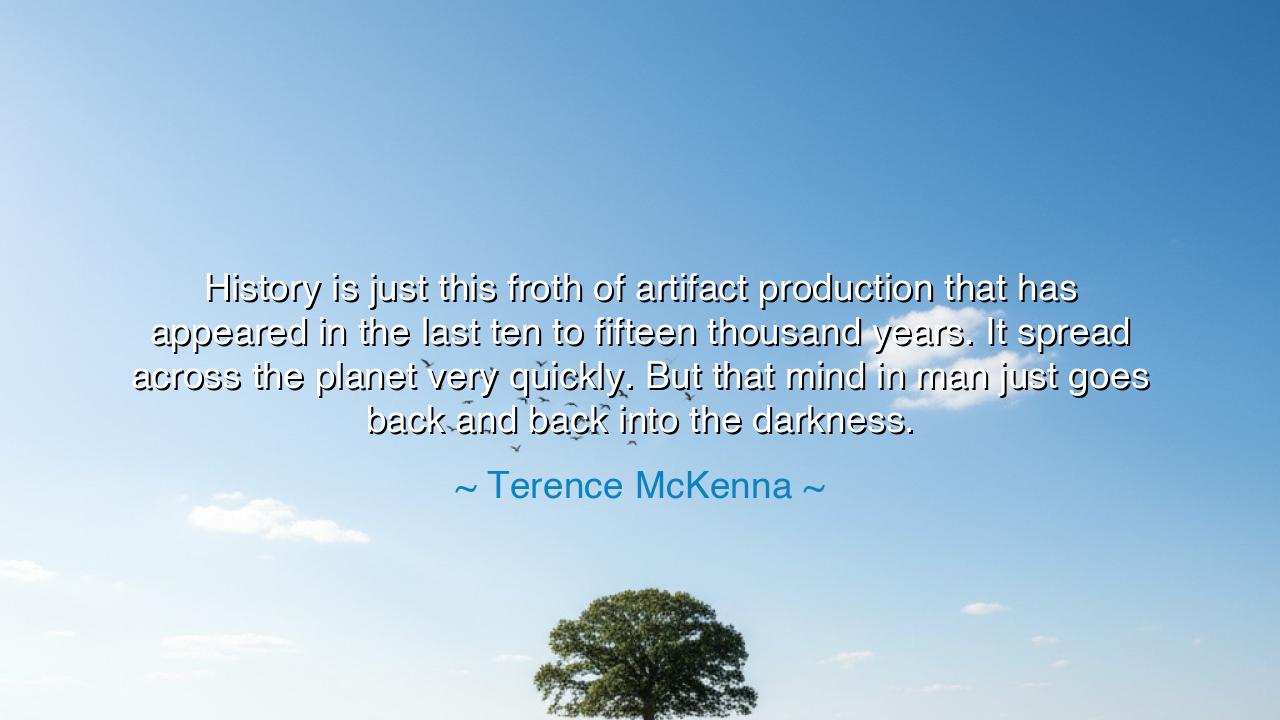
History is just this froth of artifact production that has
History is just this froth of artifact production that has appeared in the last ten to fifteen thousand years. It spread across the planet very quickly. But that mind in man just goes back and back into the darkness.






“History is just this froth of artifact production that has appeared in the last ten to fifteen thousand years. It spread across the planet very quickly. But that mind in man just goes back and back into the darkness.” Thus spoke Terence McKenna, the modern mystic and philosopher of consciousness, whose words reach beyond the veil of time and touch the primal roots of what it means to be human. In these lines, McKenna reminds us that what we call history — the rise of nations, the building of cities, the crafting of tools and temples — is but the surface foam upon an ocean infinitely deep. The human mind, he says, is far older than the pyramids or the printing press, older than the written word or the first spark struck by stone. It reaches back into the ancient night, where dream and instinct were one, and where humanity’s true essence — not its artifacts — was born.
When McKenna calls history “froth,” he does not scorn it; rather, he places it in perspective. The word evokes the image of waves upon a vast sea — bright, dazzling, and ever-changing, yet thin and fleeting compared to the depth beneath. So it is with civilization. The last ten to fifteen thousand years — the age of agriculture, architecture, and invention — may seem immense to us, but in the long span of human consciousness, it is but a heartbeat. Beneath our monuments and machines lies a million years of silence: the age of the hunter and the wanderer, when man lived by the rhythms of nature and gazed upon the stars with awe unbroken by calculation. McKenna calls us to remember that this older mind still lives within us — wild, intuitive, and bound to the mystery of existence.
This insight springs from McKenna’s lifelong exploration of consciousness and the human journey. He saw that our modern obsession with progress and artifact production — our buildings, our technologies, our endless making — has blinded us to the deeper continuity of the human spirit. We measure history by what we have built, yet the true measure of humanity lies in what we have imagined. Long before the first city rose, the mind of man was shaping worlds unseen — dreaming myths, whispering to spirits, painting on the walls of caves. The darkness to which McKenna refers is not ignorance, but origin — the fertile void from which all creativity springs. It is the darkness of the womb, not the grave.
Consider the caves of Lascaux and Chauvet in France, where artists of thirty thousand years ago painted herds of bison and horses upon stone by torchlight. These images, older than any empire, speak across millennia of minds that already knew beauty, fear, and transcendence. They were not engineers or kings; they were dreamers who sought to give form to the unseen. Civilization had not yet dawned, yet the flame of imagination already burned bright. Their art, born from the darkness, is proof that the mind of man — long before history — was already infinite. McKenna’s words remind us that we are not the children of cities, but the heirs of visionaries who lived in harmony with mystery.
The “darkness” he speaks of is also the realm of the unconscious — that vast landscape within, older than language, where dreams, instincts, and archetypes dwell. Modern man, obsessed with light, fears this darkness and calls it primitive. Yet it is from that darkness that all inspiration, all renewal, arises. The inventions of our age — the computer, the telescope, the spacecraft — are but reflections of that inner cosmos we have barely begun to explore. McKenna saw that if we forget this inner world, if we mistake the froth for the ocean, we become spiritually impoverished, lost amid our own creations.
The lesson he gives us is both humbling and liberating. Do not mistake the artifacts of history for the fullness of human existence. The mind that shaped the wheel and the atom is the same mind that once shaped stories by the campfire and saw gods in the clouds. To know ourselves truly, we must look not only forward but backward — into the depths of our own being, where the first thought was born. We must learn again to listen to silence, to dream, to feel wonder. For progress without remembrance is illusion; it is the froth without the sea beneath it.
So, my child of the modern world, take McKenna’s words as both warning and invitation. Do not let the noise of the new drown out the whispers of the ancient. Build, yes — but also remember. When you walk beneath the skyscraper, remember the cave; when you hold a machine, remember the fire. For within you still lives the old mind — patient, eternal, dwelling in the darkness that is not absence, but origin. Seek it, honor it, and you will walk not as a fragment of history, but as a continuation of humanity’s oldest truth: that we are not merely makers of artifacts, but dreamers shaped by mystery, ever reaching through time to understand the light — and the darkness — that made us.






AAdministratorAdministrator
Welcome, honored guests. Please leave a comment, we will respond soon